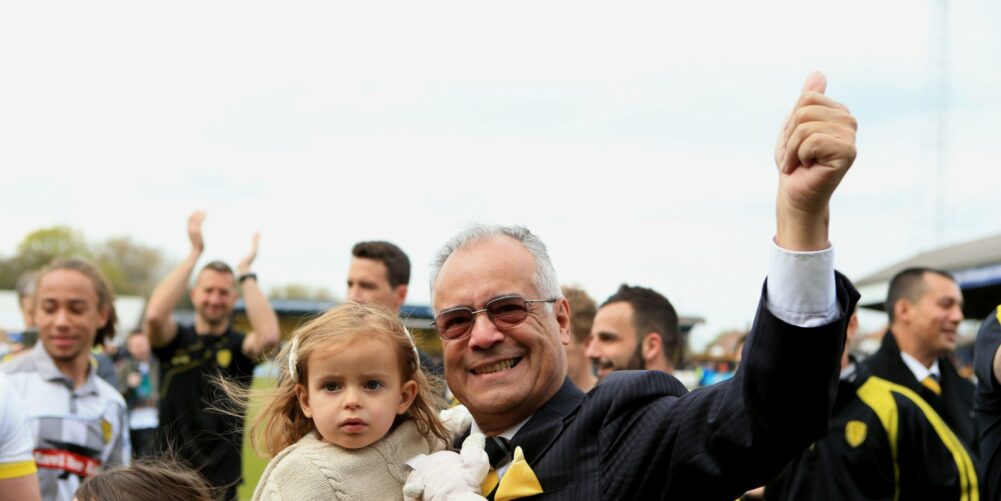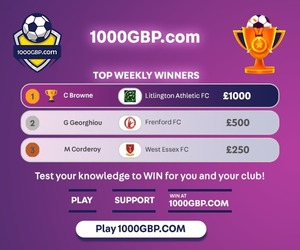By Ian Ridley
The letter was pushed through the door of Ben Robinson’s office in the town centre and came after Burton Albion’s relegation back in May.
“You tight c**t,” it read. “When are you going to spend some money on this team?”
Now, naturally, fans grow angry, feelings run high, especially when you’ve gone down on the last day of the season, and in its final minutes.
But come on… Ben Robinson? Burton Albion? And relegation from the CHAMPIONSHIP for a club traditionally a Non-League set-up before being transformed by a visionary owner and chairman in conjunction with a trusted manager in Nigel Clough whose ingenuity has delivered that vision?
“That’s the downside of football,” says Robinson with enviable dignity. “You do get some fickle fans, who don’t perhaps remember the old days.”
To offer perspective… I for one recall Burton’s old Eton Park ground back in the day, cinder terracing and all, and a club treading water in alternating between Southern and Northern Premier League.
Now they exist as a League One club in a 7,000-capacity stadium that still feels new though opened 13 years ago.
When I visited, last weekend against Coventry City, there were kids playing in the morning on the 3G pitches alongside that also make up what is clearly a huge community hub and asset.
The urbane, unflustered Robinson, in partnership with the canny Clough, has turned his hometown club into a footballing force, mirroring his own humble beginnings growing up on a Burton council estate post-War as the son of a black American soldier he never knew.
On behalf of all Non-League clubs who aspire to become such community assets via a new stadium, and rise through the pyramid with stable leadership and financial sustainability, I wanted to find out how it was done.
Robinson, a decent young player himself, was taken to watch Burton by his stepfather Frank, so had an embedded feeling for the club when approached to become commercial director in 1975, having been successful in his insurance business.
He became chairman in 1976 and the club enjoyed good times under him, and Neil Warnock’s management, but a combination of business interests and the age-old boardroom politics led to Robinson quitting in 1986.
When he was persuaded to return in 1995, it all began to take off. He assembled a consortium to buy the club in 1997 from well-known local figure Sir Stanley Clarke and appointed Nigel Clough the following year. By 2002, they were in the Conference.
Contacts
The new ground was finished in 2005, Clough one of those suggesting to Robinson they make an offer for the derelict 14 acres of the Pirelli sports ground. They did well to get the land for £1.2 million – its cheapness due to the amount of work that needed doing – and to generate £6 million from developers for Eton Park, borrowing some to build the stadium for £7.4 million.
So how did he do it?
“I’d forged good contacts with people locally, including the council, and they could see the benefits for the town of it staying a recreational site,” says Robinson. “Inevitably with clubs who sell their asset they have to move out of town but we were fortunate that we could remain central and had no issue with fans.
“We made sure we had a decent car park and things like a big lounge and kitchen so we could have a facility that delivered levels of income we could only dream about before. Quite often on a match day in the Championship, we would do 600 meals.” Not that it all went smoothly.
“I said to the project manager ‘don’t tell me there’s an overspend’ but he did,” Robinson adds. “It was half a million. So I haven’t done everything right. But then after Sir Alex Ferguson brought Manchester United to open the ground officially in the November, we drew them again in the FA Cup in the January and that paid for the overspend.”
Indeed, Albion took 11,000 fans to Old Trafford for the replay that yielded the revenue to launch the promotion bid for League Two in 2009, Clough’s team looking a shoo-in before he departed to take the Derby County job, Roy McFarland eventually seeing them over the line.
Robinson got another good deal. “Nigel’s contract had lapsed and we’d never got round to renewing it, but to be fair, Derby paid us £40,000 compensation and I got a friendly for three seasons allowing us to keep all the proceeds.”
Inspirational
Post-Clough, Robinson had a knack for picking managers, among them Jimmy Floyd Haisselbaink and Gary Rowett, only Paul Peschisolido not working out. Clough returned three years ago after spells with Derby, then Sheffield United.
So how has Robinson picked his managers?
“With Nigel, everyone knew what the Clough family stood for and how successful they had been,” says Robinson. “He came over as a good, solid, honest person who would grasp the opportunity. One of the first things he did was to get rid of his big Mercedes because he didn’t think it was applicable to a manager of a little club.
“It’s the feeling you’ve got for somebody. How strong are they? They need lots of strength to deal with different characters and egos, so you need a personality to understand people and get them to play for you. You also need a knowledge of the game and a passion that makes them inspirational.
“Pardon the expression, but there’s a lot of bull in football and it’s seeing through that and seeing what they really stand for. I never wanted a manager who tells me something he thinks I want to hear.”
Two factors have played a part in his balanced nature; first, after the terrible disappointment of losing an FA Trophy semi-final to Matlock in 1975, he vowed never to let results affect him again; second, he lets managers get on with things.
“For example, when Gary Rowett was manager, we played Adam McGurk up front on his own against Chesterfield,” he recalls. “I said to one of my directors ‘Bloody hell, why are we playing a lone striker?’ We beat them 2-0 and Adam scored two goals, so what do I know?”
Robinson is also big on sustainability. He has put, he reckons, ‘only’ £500,000 personally into the club down the years, to ease cash flow here and there, but learned early on when the club lived on an overdraft that simply pumping money in would not work long-term.
The key has been generating revenue and keeping the playing budget competitive, but within the means of a club with average gates of only 3,321, to Robinson’s ongoing disappointment.
“Most years we have made a profit,” he says. “In our first year in the Championship it was £1.3 million.” Our letter-writing friend may not have liked it, but may one day see the sense of establishing a framework for the long-term viability of the club.
So how does Robinson endure such brickbats? And all the responsibility and downsides? They have included, he says, only rare moments of subconscious racism, when opposing directors look past him at one of his fellow Burton directors they perceive must be the chairman. He has also, admirably, refused to enter an opponents’ boardroom when they wouldn’t admit a female Burton director. “You develop a strength of character when you come from humble beginnings,” he says. “Hopefully I have learned something on the journey. There are times when you need a lot of diplomacy, patience and understanding. Mind you, I can call it how it is when I need to.
“The best quote I have heard is Nelson Mandela’s, about how sport can give people hope where previously they had despair. What impresses me is the satisfaction that people get. I probably wouldn’t have been involved for as long as I have but for seeing the impact it has had in the community.”
So here’s to you Mr Robinson. It’s not that football needs more black people in positions of influence – though it clearly does. It’s that football needs more people like this beacon of inspiration for those in the Non-League game.






















